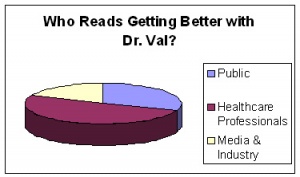November 23rd, 2008 by Dr. Val Jones in Humor, True Stories
5 Comments »
I want to ask you which would be more important: If all of the doctors in the country somehow disappeared or all the trial lawyers in America somehow disappeared? We can live without medical care, but we cannot live without justice.
— Gerry Spence
With our dwindling primary care force (and many PCPs considering leaving medicine), it looks like Gerry might get to test his hypothesis sooner than he thinks.
h/t to Dr. Wes for finding this astonishing quote.
Background:
Lawyer Gerry Spence, who was awarded the CAOC Lifetime Achievement Award, told conference attendees that legal representation is essential, even more important than health care, for people.
“We have to redefine who we are: We are the most important people in America,” Spence said. “There is no other profession in America that fights for freedom, that fights for what America is about, that fights for justice for ordinary people.”
November 22nd, 2008 by Dr. Val Jones in Opinion
1 Comment »
I don’t subscribe to many newsletters, but the Galen Institute’s Health Policy Matters is always a provocative read. Here’s an excerpt from this week’s newsletter:
Incoming White House Chief of Staff Rahm Emanuel said this week that universal coverage will be an early, top priority of the Obama administration.
But where is the money going to come from to pay for these massive reform agendas, which were developed before the meltdown of Wall Street, the $700 billion rescue package, and a projected $1 trillion deficit?
The Obama plan is estimated to cost an additional $100 to $160 billion in the first year alone, yet the president-elect made fiscal responsibility a big part of his campaign platform. If the White House is going to extend the plan to mean universal coverage, the bill will be even more expensive.
Mr. Obama also will be facing the huge flood of red ink in Medicare, with the program starting to run out of money in 2017, about the time a second Obama term would end.
It’s impossible to make predictions in the current topsy-turvy political and economic climate, but these power political power centers, fiscal realities, and the urgency of other issues, including Detroit’s looming bankruptcy and an unstable geo-political climate, make these dreams of sweeping health reform a major challenge.
Mr. Obama will likely use the pending expiration on March 31 of the State Children’s Health Insurance Program (which will be renamed) as a vehicle to expand health coverage to all children and possibly even enact his mandate for children’s coverage. That probably means funneling more money to the states through Medicaid since they must pay part of the costs.
After SCHIP, Congress will take the lead on major health reform legislation from there.
We need to remember that 82% of the American people are happy with their own health care and only a minority is willing to pay higher taxes to get to universal coverage. Also, the employer mandate is a new tax, and it is going to be especially difficult to impose during the economic crisis. And can we really tell people who have lost their jobs that now, in addition to everything else, they are going to be forced to buy health insurance?
November 20th, 2008 by Dr. Val Jones in Audio, Celebrity Interviews
3 Comments »
 |
|
Debi Mazar
|
You may know actor Debi Mazar from her work in the movie Goodfellas, and from her role as Shauna on the HBO hit TV show, Entourage. But I know Debi as a busy mom who struggles with insomnia. I caught up with her a few days ago to find out how she’s coped with those sleepless nights.
Listen to the podcast here:
[audio:http://blog.getbetterhealth.com/wp-content/uploads/2008/11/debimazar.mp3]
Dr. Val: When did insomnia first become a problem for you?
Mazar: Insomnia is surprisingly common. It affects 60 million Americans: 40% of women and 30% of men. My struggle with insomnia began in my mid to late 20’s when my professional and love life went into full swing. I ate well and exercised, but started having trouble falling asleep every night. I went to see a doctor because I didn’t realize that there were many things that I could do about it on my own.
Dr. Val: What are some of the non-medical treatments that worked for you?
Mazar: Cutting back on caffeine, sugar, and alcohol, and exercising only early in the day, having a healthy sex life, and getting myself on a sleeping schedule. I also tried to reduce stress levels in my life by not going to bed angry, by unplugging from TV and the Internet, and I made my bedroom a very cozy, dark environment that would be condusive to sleep. When you’re a mom, sleeping pills aren’t a good option because you might have to get up in the middle of the night. I have a full list of insomnia tips at bedsidebriefings.com
Dr. Val: I bet that insomnia is a common problem in Hollywood. Has that been your experience?
Mazar: I don’t consider myself to be part of “Hollywood” I’m just an average mom who worries about the world we live in and our economy. The news can cause a lot of anxiety – regardless of what you do for a living. It keeps us all awake at night. Of course, chronic insomnia can increase our risk of depression, weight gain, diabetes and hypertension.
Dr. Val: What is the most important thing for Americans to know about sleep?
Mazar: Sleep is the time when your body repairs itself, so sleep is essential for good health. Without it, we all fall apart.
November 17th, 2008 by Dr. Val Jones in Announcements
4 Comments »
I was a panelist at Edelman’s CHPA New Media Summit today in New Brunswick, NJ. Matthew Holt (of the Healthcare Blog and Health 2.0) was the keynote speaker, and I participated on a panel discussion with Dr. Roy Poses. It was exciting to meet Roy in person for the first time, as I’ve been following his policy blog for some time.
Matthew presented a very rosy picture of Health 2.0 (consumer-driven healthcare), more or less suggesting that it could provide a large part of the solution to our current healthcare crisis. I countered with a more cautious view, explaining that expert engagement would be critical to Health 2.0’s success.
Matthew argued that sites like Patients Like Me were enabling patients “to do their own clinical trials online,” and that this was opening a whole new avenue for research. Dr. Poses and I were fairly concerned about this suggestion, primarily because we understand how easy it is to draw false conclusions from data, especially when the data are not collected in a systematic fashion.
I explained to the audience that association does not prove causation (E.g. Do matches cause lung cancer? No, though it’s true that people who smoke are more likely to carry matches). I also described a case in which a Health 2.0 principle went terribly awry: a group of consumers were asked to rate their medications for efficacy by disease/condition. This was supposed to leverage the “wisdom of the crowds” to determine which medicines worked best (by popular vote). Of course, the result was that every pain syndrome (low back pain, headaches, fibromyalgia, etc.) resulted in a narcotic pain medicine as the highest ranked treatment option. Do you really need Oxycontin for that tension headache of yours? Obviously, narcotics are popular among users – but are a last resort for pain management in the real world. The “wisdom of crowds” rarely works in healthcare.
Matthew agreed to disagree with me on a number of issues – but we certainly found common ground on the primary care crisis. He and I both believe that a shortage of primary care physicians is going to result in a catastrophic shortage of care for Baby Boomers in the next decade. Dr. Poses added that primary care physicians make the same salary as school teachers in his home state of Rhode Island.
I think we have to agree with KevinMD – the way forward is not going to be pretty.
November 16th, 2008 by Dr. Val Jones in Announcements
No Comments »
I asked my blog readers to tell me who they were (poll results: n=145) and this is the breakdown:

I think that’s pretty interesting data – it seems that my blog appeals to doctors, nurses, allied health professionals, the general public and media/industry folks to boot. I was a little sad to see that pets were not as large a contingent as I had expected. I’ll need to work harder to reach that demographic, I suppose.
Gratuitous cat photo:














